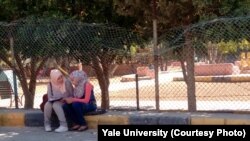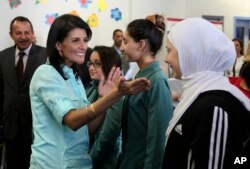Researchers have developed a questionnaire for aid groups working with teenage Syrian refugees that measures resilience – the ability to overcome challenges. Aid groups, including Mercy Corps, are using it to identify obstacles to resilience, and factors that increase self-confidence.
“Access to peers, access to mentors, family, education? What is helping young people overcome adversity?” said Matt Streng, Mercy Corps’ Director of Youth, Gender and Girls.
With that information, his group is adapting its programs that build teamwork, vocational and life skills.
Working with young people in Afghanistan in 2005, Yale anthropologist Catherine Panter-Brick learned that for refugees, it is their future, much more than their past, that is most important to them. To her the tool represents “a model that is focused on people’s strengths rather than their fragility; on their capabilities rather than on their vulnerabilities; on their resources rather than risk.”
A concise, easy-to-use tool
To develop the questionnaire, Panter-Brick and colleagues partnered with Mercy Corps and Hashemite University in Jordan. There are more than 650,000 Syrian refugees in Jordan – half of them under 18.
The survey they came up with is short and simple - just 12 questions, which researchers carefully translated into Arabic, taking pains to make sure they used appropriate wording. For example, People think I am fun to be with was changed to People like to spend time with me because “refugee youth claimed that a sense of ‘fun’ was inapplicable to their current existence.” My parent(s)/caregiver(s) watch me closely had a negative connotation for girls as it implied surveillance rather than supportiveness, so it was changed to really watch out for me.
Researchers also had to modify how responses were scored. For example, if a boy reported little participation in religious activities, it was an indicator of poor connection with the community. But there are few organized religious activity for girls, so a report of low religious participation from a girl would not be concerning.
Instead of just using 5 for a lot and 1 for not at all, glasses of water at varying level indicate degrees of wellness. This, researchers believe, is easier for children to readily understand.
Resilient results
The researchers found resilience was related to better mental health. For both Jordanians and Syrians, boys and girls, family support was far more critical for resilience than friendships with peers. Syrians named a hope for their future and education and their past success in overcoming trauma as sources of resilience.
While researchers from America, Canada, the U.K. and Jordan wrote this report, published in the journal Child Development, Panter-Brick explains that the original credit goes to the Syrian youth themselves.
“We hadn’t planned to do this. The people themselves tell you, ‘you’re focusing on trauma," she said. "This is not the whole of us and our life and our story. Why can’t you ask us about things that make us more positive about ourselves?’ And that is resilience.”





